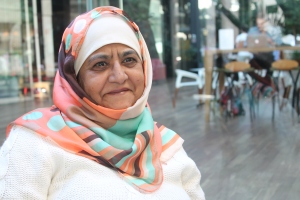Saudi Arabia’s destruction of Islamic sites under scrutiny
Written by Yazeed Kamaldien
Saudi Arabia’s controversial destruction of Islamic heritage sites, particularly linked to Prophet Muhammad, has again come under scrutiny by a local author.
Cape Town-based writer Naeema Limbada, who has traveled a number of times to Saudi Arabia, recently launched her book Remembrance of Islamic Sacred Sites.
It details various sites Limbada visited, including places in Saudi Arabia that have been destroyed.
Back in 2006, another Cape Town author and veteran journalist Shafiq Morton documented in his book, Notebooks from Makkah and Madinah, that the headquarters of Islam was the “only place in the world where people have seen fit to destroy religious sanctuaries”.
Over the last decade, Limbada traveled to nine countries in search of documenting significant sites for Muslims. In Saudi Arabia, she also met with a heritage official who confirmed the destruction of local sites.
It was on her second trip to Mecca, the Saudi Arabian city which houses Islam’s holiest mosque, that she was spurred to start documenting these sacred sites.
“When I first went to Mecca I had an incredible experience and wanted to share it with my three daughters,” said Limbada.
“Then when I took my daughters there two years later one of the sites I’d visited was buried. It couldn’t be seen. That disappointment prompted me to document the sites and the stories about it.”
The Saudi government has meanwhile demolished these sites to prevent idolatry, which Islam forbids.
The New York Times newspaper last month interviewed Irfan al-Alawi, director of the London-based Islamic Heritage Research Foundation, who confirmed the “destruction of more than 95 percent of the historic sites near the holy cities of Mecca and Medina”.
The newspaper reported that al-Alawi said “scores of tombs have been destroyed; a house associated with Muhammad’s first wife, Khadija, was replaced with a bank of public toilets; and a home believed to have belonged to his companion Abu Bakr was razed to make way for a Hilton Hotel”.
It continued: “At the same time, the Saudi government has filled Mecca with increasingly modern buildings that include the world’s third tallest building and, soon, its largest hotel.”
Limbada said she penned her book with the traveler in mind. She wanted to preserve a sense of place, despite the various sites being destroyed.
“Even though those sites are not there, just by standing on that spot where it was, and knowing what was there, it spiritually uplifted me,” she said of her journey.
“Knowing what happened there, you could stand there for hours just thinking. You transport yourself to a different era.”
Limbada said also drew “inspiration from reading lots of historical books” when she embarked on her research.
“I followed in the footsteps of iconic works. The aim was to make this information about our heritage available for future generations,” said Limbada.
“I visited sites where one of Prophet Adam’s sons is buried. I went to the sites of Jesus, who Muslims acknowledge, in Jerusalem. I cover sites that are important to Muslims and Christians.”
Limbada also visited ancient architectural wonderlands like Petra in Jordan and Egyptian ruins. She sought out tombs of Muslim saints too.
Along the way, she “climbed a lot of mountains in Mecca” and had to dispel myths “tour guides who want to make money” sell eager tourists from afar.
In one instance, said Limbada, it “took me three years to untangle and confirm the burial site of one famous Muslim saint buried in Iraq”.
“You must do your own research before listening to what tour guides tell you. I have consulted with heritage officials and religious leaders to confirm facts,” said Limbada.
“It was a tough job. I visited libraries in different countries and got people to translate documents from Arabic into English.”
Limbada said she also followed Prophet Muhammad’s advice when he said one should seek knowledge even as far as China.
“I was in China with my husband when someone in a restaurant was talking about a sahaba (companion of Prophet Muhammad) who is buried in China,” said Limbada.
“I took a taxi and went to this site. Found the place and researched it. A lot of people don’t know about it.”
Limbada said she was impressed in Turkey where the “Ottomans have a done great job in saving a lot of Islamic heritage sites”.
“They are still doing things to preserve these sites. Unfortunately in Syria, Iraq and Iran these sites have been destroyed. In Mecca and Medina sites are also being destroyed,” said Limbada.
“Our heritage is being destroyed and that saddens me.”
Morton confirmed in an interview that Saudi authorities had “even cut down trees that were planted by the Prophet Muhammad because they said people would worship the trees”.
He laid blame with Saudi’s “intolerant” version of Islam referred to as Wahabbism.
In his book, he wrote: “The silent majority, the house of Sunni Islam, has not yet awoken to its ideological hijacking – and not has it fully responded to the senseless obliteration of its rich historical legacy in its very devotional heartland.”
The New York Times reported Saudi authorities were meanwhile turning the birthplace of Wahabbism into a tourist attraction.
It said the “Diriyah complex, on the outskirts of Riyadh… will feature
parks, restaurants, and a series of museums”.
This is the area where “more than 250 years ago… the Saudi royal family… endorsed the doctrine of Sheikh Muhammad ibn Abdul-Wahhab and followed it to wage jihad against anyone who rejected their creed, gaining control of much of the Arabian Peninsula”.
It reported “hundreds of laborers are rehabilitating mud palaces once home to the Saud family and building museums celebrating its history”.
For more information about this book contact Naeema Limbada via naims.limbada@gmail.com

